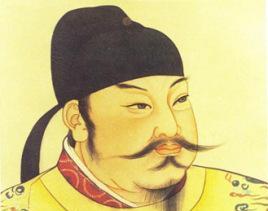Both Li Shimin and Zhu Di ascended to the throne through improper means: Li Shimin adopted the "Xuanwumen Revolution", and Zhu Di launched the "Battle of Jingnan".
After the "Xuanwumen Revolution", Li Shimin forced his father Li Yuan to abdicate and become emperor of the Tang Dynasty himself; Zhu Di had his nephew Zhu Yunjiao, the Jianwen Emperor, commit suicide after the "Battle of Jingnan", and then ascended to the throne of the Ming Emperor. Therefore, both of these people have taken the throne through improper means.

However, over the past few hundred years, Li Shimin has become an emperor in history books and folk commentaries, who has become a ruler who has become a loyal and obedient ruler, who has worked hard to govern, who knows people and is good at his duties, and who has governed the country enlightenedly, and Li Shimin's rule of Chastity has laid a very good foundation for the future Tang Dynasty.
After Zhu Di seized the throne, he used harsh punishments such as skinning, frying, and boiling to kill many ministers of the former dynasty, and also implemented a dark and terrifying secret service rule, turning the Ming Dynasty into a human hell. Zhu Di adhered to the genes of his father Zhu Yuanzhang's blood and was a greatly reviled emperor in history.
The following is an example of the differences between Li Shimin and Zhu Di.
First, the object and essence of the coup d'état are different,
Li Shimin launched the "Xuanwumen Rebellion", and the main target he dealt with was not the emperor, but his brother Li Jiancheng, whose essence was "taking the concubine";
And Zhu Di launched the "Battle of Jingnan", and his sharp blade pointed directly at the orthodox emperor Zhu Yunjiao, whose essence was "usurpation".
The "struggle to seize the concubine" has existed in all dynasties and dynasties, and the prince has taken it for granted that he will stop at nothing to seize the throne, and it is not strange that Li Shimin's means of "seizing the concubine" are indeed fierce, but because its essence is different from "usurpation", it is more acceptable to future generations.
In traditional Chinese values, "usurping the throne by killing the king" is the most heinous and unforgivable crime. Although Zhu Di did not personally kill the Jianwen Emperor Zhu Yunjiao, it was an indisputable fact that he usurped the throne by force. What's more, it was not that Zhu Di did not want to kill Zhu Yunjiao, but that Zhu Yunjiao's whereabouts were unknown, which made him unable to do anything.
Second, Li Shimin ruled the country with "benevolence" and Zhu Di ruled with "violence."
During Li Shimin's reign, he practiced "ruling the world with civility", and he humbly accepted advice, practiced frugality, advised peasants and sangsang, avoided conquest, enabled the people to recuperate, and achieved the ultimate goal of Guotai and Min'an with the gentlest means.
During Zhu Di's reign, whether it was personally conquering the southern expedition to the north to open up the country, or sending Zheng He to "go to the West seven times", although they were all for the country and the people, they were all acts of labor and wealth, but behind the prosperity was that the people did not have a good life and complained.
Third, attitudes toward courtiers are different.
For the courtiers, Li Shimin was a benevolent prince, and Zhu Di was undoubtedly a tyrant.
Taking the treatment of the enemy's old subjects as an example, Wei Zheng was Li Jiancheng's confidant, but Li Shimin treated him with courtesy and was humble, and even if he was repeatedly criticized or even accused by Wei Zheng, he did not remember hatred, but reused and trusted him.
On the other hand, Zhu Di, for Zhu Yunjiao's old minister Fang Xiaoru and others, he not only did not treat them with leniency, but also exterminated the three ethnic groups, and even the ten tribes, which can be described as extremely cruel.
History is fair, and in the end, Li Shimin's name of the afterlife is naturally very good, and Zhu Di naturally gets the name of cruelty.